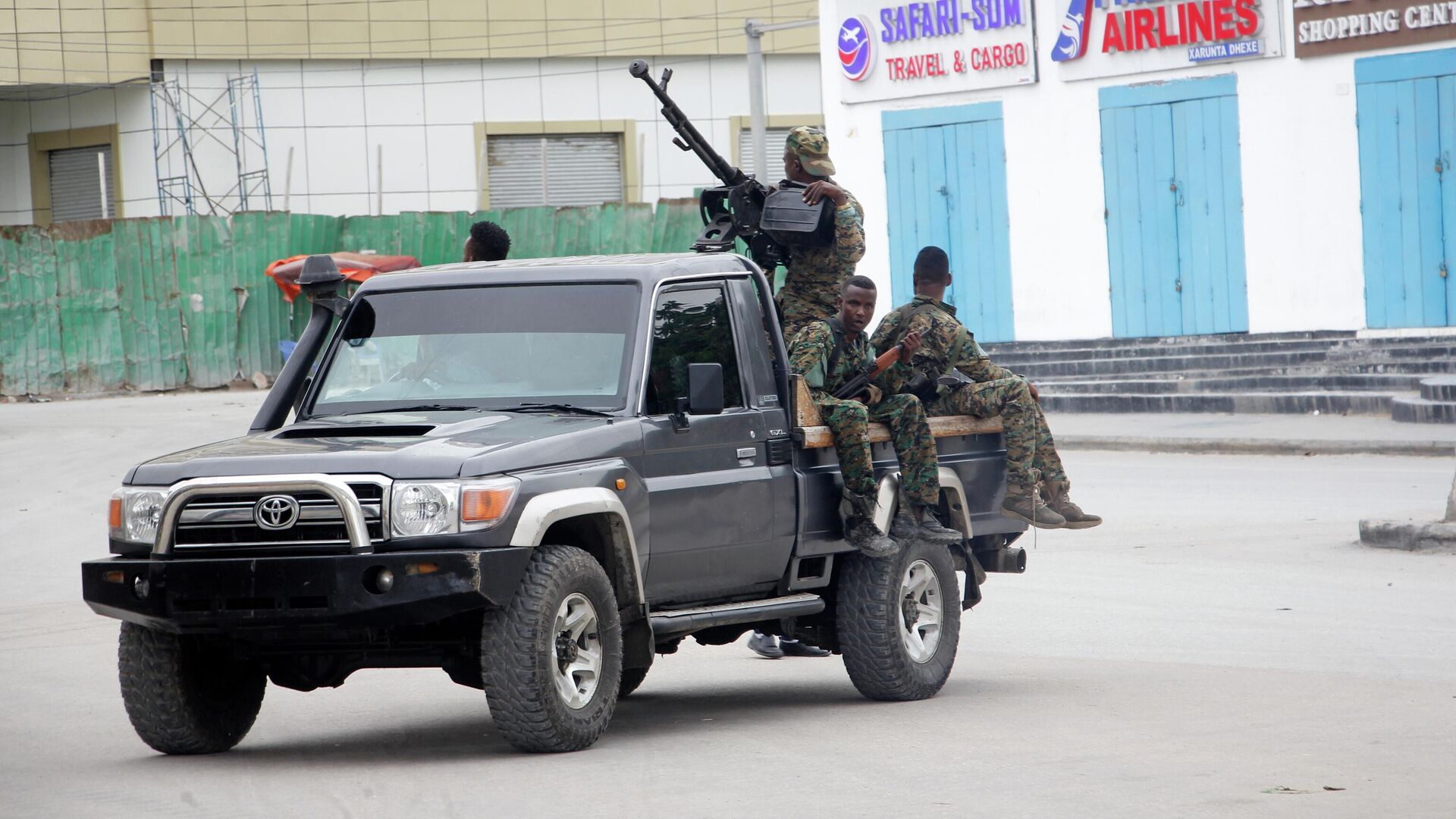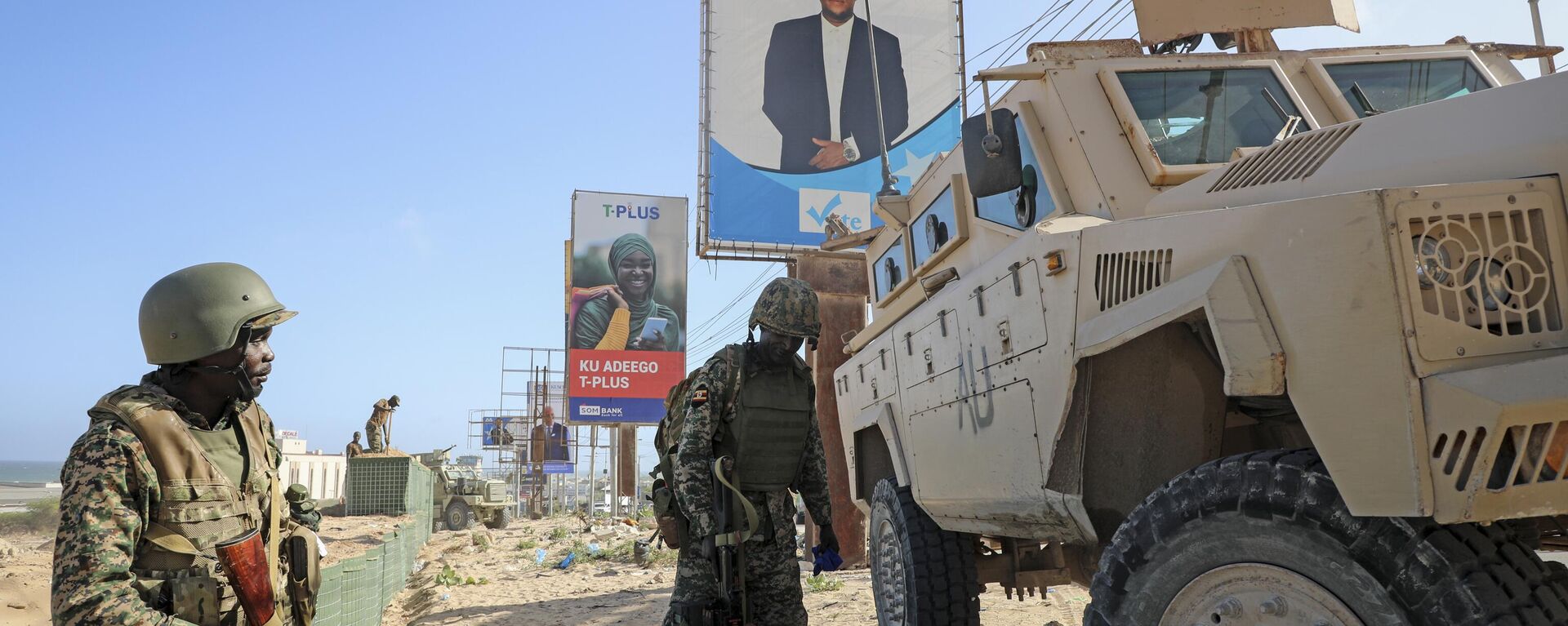https://en.sputniknews.africa/20230415/russia-should-be-present-in-somalia-to-stop-war-counter-west-politician-says-1058627022.html
Russia Should Be Present in Somalia to Stop War, Counter West, Politician Says
Russia Should Be Present in Somalia to Stop War, Counter West, Politician Says
Sputnik Africa
Somalia has been involved in a number of brutal civil wars, prompting the deployment of numerous UN and African Union peacekeeping missions as well as harsh import restrictions due to an international arms embargo.
2023-04-15T17:35+0200
2023-04-15T17:35+0200
2023-04-15T17:35+0200
sub-saharan africa
horn of africa
somalia
east africa
war
conflict
russia
https://cdn1.img.sputniknews.africa/img/07e7/04/0f/1058629235_0:285:3072:2013_1920x0_80_0_0_a4e96f00b866b6a4fe4832fca462546d.jpg
Russia should be present in Somalia to end the ongoing conflict in the African country and serve as a counterweight to Western influence in Africa as a whole, Siad Abdi Nur, a representative of the Somalian opposition, told Sputnik.The politician argued that the West's end game in Somalia is to maintain the status quo, thereby crippling the country and allowing for a takeover of its natural resources.Destabilization for Resource ExtractionApart from that, the opposition politician added that the West is interested in destabilizing Somalia in order to control the country's natural resources, arguing that the influence of Western countries is comparable to its role in fomenting the Ukraine crisis.The career officer noted that Somalia has large reserves of natural resources, including uranium, oil and gas, and has vast fertile territories that could feed the entire African continent.The Somali opposition politician elaborated on the influence of the West on the political elite of the country, recalling that Western states and NGOs controlled by them appoint representatives of the Somali diaspora, previously living in the West, to senior positions in the state in order to fulfill the agenda in accordance with Western interests.Abdi Nur, who also used to serve as an adviser to former Somalian President Mohamed Abdullahi, also known as "Farmaajo," is currently visiting Russia. A career officer in the Somalian Army, Abdi Nur fought in the 1993 Battle of Mogadishu against US troops, during which the US military suffered heavy casualties and had to withdraw from an international contingent present in the African country. He later took the helm of a 7,000-strong counterterrorist brigade.Somalia effectively ceased to exist as a single state in 1991 with the fall of the dictatorial regime of Mohamed Siad Barre. The international community recognizes the federal government as the only legitimate authority in the country, which controls the capital city of Mogadishu and a number of other areas.The remaining parts of Somalia are under the control of unrecognized state entities or are self-governing territories. In particular, the unrecognized Republic of Somaliland is located in the northern part of the country, and the Puntland region, which declared autonomy in 1998, is located in the eastern part.
https://en.sputniknews.africa/20230403/1058629663.html
horn of africa
somalia
east africa
russia
Sputnik Africa
feedback@sputniknews.com
+74956456601
MIA „Rossiya Segodnya“
2023
News
en_EN
Sputnik Africa
feedback@sputniknews.com
+74956456601
MIA „Rossiya Segodnya“
Sputnik Africa
feedback@sputniknews.com
+74956456601
MIA „Rossiya Segodnya“
horn of africa, somalia, east africa, war, conflict, russia
horn of africa, somalia, east africa, war, conflict, russia
Russia Should Be Present in Somalia to Stop War, Counter West, Politician Says
Kirill Kurevlev
Managing Editor
Since the early 1990s, Somalia, which virtually ceased to exist as a single state, has been involved in a number of brutal civil wars, prompting the deployment of numerous UN and African Union peacekeeping missions as well as harsh import restrictions due to an international arms embargo.
Russia should be present in Somalia to end the ongoing conflict in the African country and serve as a counterweight to Western influence in Africa as a whole, Siad Abdi Nur, a representative of the Somalian opposition, told Sputnik.
"Russia can even participate in Somalian politics and can win, and Somalia would be at peace, because we have got a solution where Russia can win without the West. The West does not want my country to be at peace; they create chaos, people kill each other, and continue this war," Abdi Nur said.
The politician argued that the West's end game in Somalia is to maintain the status quo, thereby crippling the country and allowing for a takeover of its natural resources.
"You know, when they are giving you chaos and chaos and chaos, people would become paralyzed and 'totally zero,' while during that time the West is benefiting: they want to take the resources … We have uranium, minerals, (fossil) fuels, natural gas, and agriculture around two big rivers with which we can feed the whole of Africa if properly implemented," Abdi Nur added.
Destabilization for Resource Extraction
Apart from that, the opposition politician added that the West is interested in destabilizing Somalia in order to control the country's natural resources, arguing that the influence of Western countries is comparable to its role in fomenting the Ukraine crisis.
"They do not want a Somali state, they want an armed government that they will form in their own interests [...] Perhaps half a million of our people are getting their salaries, and the West is investing this money, as it did in Ukraine - this is their method: they invest in the problem to take advantage of it, and so after we finish fighting and killing each other, they will want to reap the benefits, and they will take over and take control of the country, because our country is rich in resources," he explained
The career officer noted that Somalia has large reserves of natural resources, including uranium, oil and gas, and has vast fertile territories that could feed the entire African continent.
“We have uranium, minerals, [fossil] fuels, natural gas and fertile land around two major rivers that we can feed all of Africa with if done right. That’s why they are investing: they want these resources to be under their control," Abdi Nur added.
The Somali opposition politician elaborated on the influence of the West on the political elite of the country, recalling that Western states and NGOs controlled by them appoint representatives of the Somali diaspora, previously living in the West, to senior positions in the state in order to fulfill the agenda in accordance with Western interests.
“Each NGO will select one person and actually propose someone who is not Somali. He may look like a Somali, but most of these people are from the diaspora, because in 1980, when my country was shocked, they took half a million my people to America and the UK, gave them citizenship, and then brainwashed them and returned them [back]," the politician stressed.
Abdi Nur, who also used to serve as an adviser to former Somalian President Mohamed Abdullahi, also known as "Farmaajo," is currently visiting Russia. A career officer in the Somalian Army, Abdi Nur fought in the 1993 Battle of Mogadishu against US troops, during which the US military suffered heavy casualties and had to withdraw from an international contingent present in the African country. He later took the helm of a 7,000-strong counterterrorist brigade.
Somalia effectively ceased to exist as a single state in 1991 with the fall of the dictatorial regime of Mohamed Siad Barre. The international community recognizes the federal government as the only legitimate authority in the country, which controls the capital city of Mogadishu and a number of other areas.
The remaining parts of Somalia are under the control of unrecognized state entities or are self-governing territories. In particular, the unrecognized Republic of Somaliland is located in the northern part of the country, and the Puntland region, which declared autonomy in 1998, is located in the eastern part.


